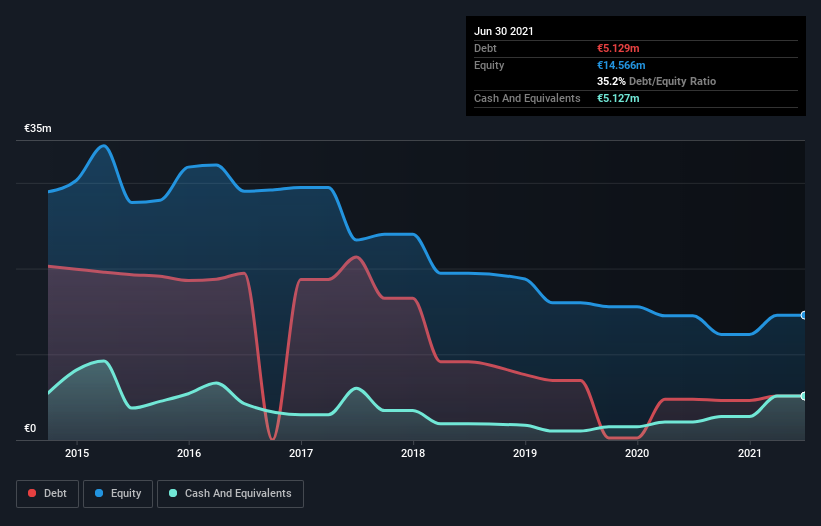
Legendary fund manager Li Lu (who Charlie Munger backed) once said, 'The biggest investment risk is not the volatility of prices, but whether you will suffer a permanent loss of capital.' It's only natural to consider a company's balance sheet when you examine how risky it is, since debt is often involved when a business collapses. Importantly, Turbon AG (FRA:TUR) does carry debt. But is this debt a concern to shareholders?
Why Does Debt Bring Risk?
Generally speaking, debt only becomes a real problem when a company can't easily pay it off, either by raising capital or with its own cash flow. If things get really bad, the lenders can take control of the business. However, a more usual (but still expensive) situation is where a company must dilute shareholders at a cheap share price simply to get debt under control. By replacing dilution, though, debt can be an extremely good tool for businesses that need capital to invest in growth at high rates of return. When we examine debt levels, we first consider both cash and debt levels, together.
Check out our latest analysis for Turbon
What Is Turbon's Debt?
The image below, which you can click on for greater detail, shows that at June 2021 Turbon had debt of €5.13m, up from €4.75m in one year. However, because it has a cash reserve of €5.13m, its net debt is less, at about €2.0k.

How Healthy Is Turbon's Balance Sheet?
We can see from the most recent balance sheet that Turbon had liabilities of €15.7m falling due within a year, and liabilities of €15.7m due beyond that. On the other hand, it had cash of €5.13m and €6.73m worth of receivables due within a year. So its liabilities total €19.5m more than the combination of its cash and short-term receivables.
This deficit is considerable relative to its market capitalization of €20.6m, so it does suggest shareholders should keep an eye on Turbon's use of debt. This suggests shareholders would be heavily diluted if the company needed to shore up its balance sheet in a hurry. But either way, Turbon has virtually no net debt, so it's fair to say it does not have a heavy debt load!
It was also good to see that despite losing money on the EBIT line last year, Turbon turned things around in the last 12 months, delivering and EBIT of €50m. The balance sheet is clearly the area to focus on when you are analysing debt. But you can't view debt in total isolation; since Turbon will need earnings to service that debt. So when considering debt, it's definitely worth looking at the earnings trend. Click here for an interactive snapshot.
Finally, a business needs free cash flow to pay off debt; accounting profits just don't cut it. So it's worth checking how much of the earnings before interest and tax (EBIT) is backed by free cash flow. Considering the last year, Turbon actually recorded a cash outflow, overall. Debt is usually more expensive, and almost always more risky in the hands of a company with negative free cash flow. Shareholders ought to hope for an improvement.
Our View
While Turbon's conversion of EBIT to free cash flow has us nervous. For example, its interest cover and net debt to EBITDA give us some confidence in its ability to manage its debt. Taking the abovementioned factors together we do think Turbon's debt poses some risks to the business. While that debt can boost returns, we think the company has enough leverage now. When analysing debt levels, the balance sheet is the obvious place to start. But ultimately, every company can contain risks that exist outside of the balance sheet. Be aware that Turbon is showing 3 warning signs in our investment analysis , you should know about...
If, after all that, you're more interested in a fast growing company with a rock-solid balance sheet, then check out our list of net cash growth stocks without delay.
If you’re looking to trade a wide range of investments, open an account with the lowest-cost* platform trusted by professionals, Interactive Brokers. Their clients from over 200 countries and territories trade stocks, options, futures, forex, bonds and funds worldwide from a single integrated account. Promoted
Valuation is complex, but we're here to simplify it.
Discover if Turbon might be undervalued or overvalued with our detailed analysis, featuring fair value estimates, potential risks, dividends, insider trades, and its financial condition.
Access Free AnalysisThis article by Simply Wall St is general in nature. We provide commentary based on historical data and analyst forecasts only using an unbiased methodology and our articles are not intended to be financial advice. It does not constitute a recommendation to buy or sell any stock, and does not take account of your objectives, or your financial situation. We aim to bring you long-term focused analysis driven by fundamental data. Note that our analysis may not factor in the latest price-sensitive company announcements or qualitative material. Simply Wall St has no position in any stocks mentioned.
*Interactive Brokers Rated Lowest Cost Broker by StockBrokers.com Annual Online Review 2020
Have feedback on this article? Concerned about the content? Get in touch with us directly. Alternatively, email editorial-team (at) simplywallst.com.
About DB:TUR
Turbon
Engages in the development, production, and sale of typeface printing accessories in Europe, the United States, and Asia.
Excellent balance sheet second-rate dividend payer.
Market Insights
Community Narratives




